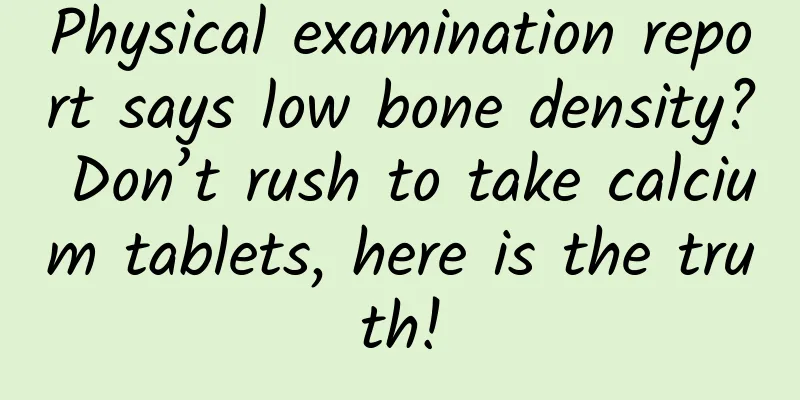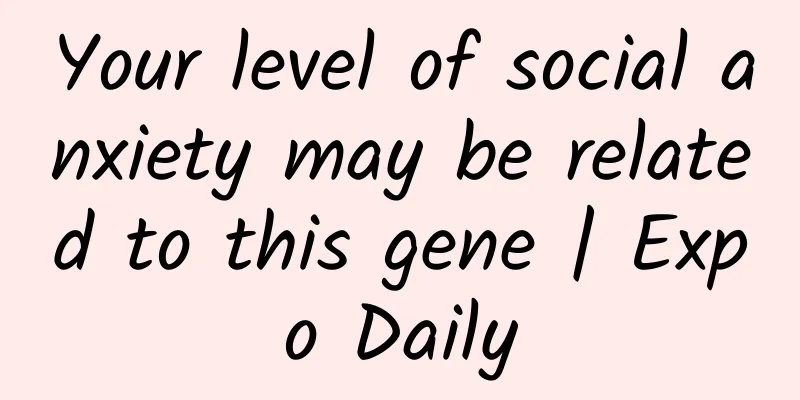Physical examination report says low bone density? Don’t rush to take calcium tablets, here is the truth!

|
When low bone density is found during a physical examination, many people's first reaction is to "quickly supplement calcium." However, is this approach really scientific? Today, let's talk about the truth behind low bone density and how to deal with it scientifically. 1. Low bone density ≠ calcium deficiency Bone density is an important indicator of bone mineral content, but it is not completely equivalent to calcium deficiency. Bone health depends not only on the calcium content, but also on factors such as bone structure, the quality of bone collagen, and the balance of bone metabolism. In fact, low bone density may be caused by a variety of reasons, such as insufficient vitamin D, lack of exercise, long-term use of certain medications, and even some chronic diseases. 2. Risks of blindly supplementing calcium Many people think that as long as they take more calcium, their bone density will naturally increase. However, studies have shown that the effect of calcium supplementation alone is actually very limited. What's worse, excessive calcium supplementation may cause a series of health problems, such as kidney stones and vascular calcification. Especially for the elderly, the daily calcium intake is recommended to be controlled at 1000-1200 mg. Exceeding this range may increase the risk of cardiovascular disease. 3. How to deal with low bone density scientifically? (1) Dietary adjustment High-calcium diet : Eat more calcium-rich foods such as dairy products, beans, nuts, and dark green vegetables. Supplement vitamin D : Vitamin D can significantly enhance calcium absorption, which can be supplemented by sun exposure (at least 20 minutes a day) or eating foods rich in vitamin D (such as milk, egg yolks, fish, etc.). Balanced diet : Keep a varied diet and avoid high-salt, high-fat diets, as high salt can accelerate calcium loss. (2) Exercise intervention Weight-bearing exercises : such as walking, jogging, dancing, etc. These exercises allow the body to bear its own weight, stimulate bone growth, and help increase bone density. Muscle strengthening exercises : Using elastic bands, dumbbells, etc. for strength training can increase muscle strength and reduce the burden on bones. Balance and flexibility training : Exercises such as yoga and Tai Chi can help improve body coordination and balance, and reduce the risk of falling. (3) Regular check-ups and professional guidance <br /> If your bone density is low, it is recommended that you go to a regular hospital for a check-up to rule out the influence of other diseases. Under the guidance of a doctor, choose appropriate supplements or medications according to your specific situation. 4. Conclusion Low bone density does not mean that you have to take calcium supplements like crazy. Blind calcium supplementation not only has limited effect, but may also bring health risks. Scientific diet, reasonable exercise and regular health checks are the right way to maintain bone health. So, when you see "low bone density" on the physical examination report, don't panic, start with your lifestyle to make your bones healthier! |
Recommend
After checking out more than 30 types of vinegar in the supermarket, the most recommended one is... You won’t waste your money after reading this!
In the fast-paced life, people often pursue simpl...
Internet product monetization: transaction model and billing method of online advertising
This article will help you build the system outli...
This key indicator in the collider is actually related to the barn
What does "brightness" mean in particle...
Zhihu Product Analysis Report
"Where there is a question, there is an answ...
10 secrets of why iPhone is so expensive, let Apple continue to fly for a while
Apple's biggest adventure was completed last ...
How to write a marketing plan?
In the process of making the annual promotion pla...
Uncle San's practical experience in "How to start a Douyin account at a regular price", team beta version
Contents: How to start a live broadcast account w...
Public account big V [Understand the leading stocks] Fupange column group + course
Public account big V [Understand the leading stoc...
What kind of grass is this two-meter-high grass on the grave?
The popularity of customs such as planting willow...
A Tesla Model 3 consumes $1,500 worth of semiconductors. Chips may become the weak spot of China's auto industry
UBS’s recent fourth and fifth reports are very in...
Observation on Vietnam's electric vehicle market: weak in strength but big in ambition, always wary of Chinese brands
In recent years, have you often heard that "...
Are the sacrificial codes of the Shang Dynasty hidden under the stadium?
Text and photos by Liu Wenke 1. Discovery of the ...
[Comic] Programmers use Double 11 to get rid of 20 years of singles
【51CTO.com original article】 Click me to create a...
"Academic Education" Baidu bidding replicable optimization methodology
The academic education industry is a relatively s...









